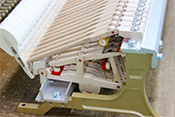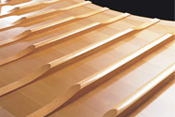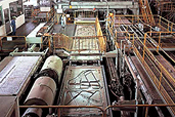Your shopping cart is currently empty. .

Piano Components
(Features Every Quality Piano Should Include)Action
Assembling the action mechanisms of a piano requires highly skilled technicians and specialized techniques. A mere one-millimeter deviation
in strike-point position can adversely affect the sound. Unlike other manufacturers, Yamaha produces each and every one of the 5,500 components in-house using its proprietary precision machinery, resulting in actions that are extremely precise and faithful to design specifications. Also, to withstand many years of use, action mechanisms must be made highly resistant to continuous impact as well as to the effects of changes in temperature and humidity. Yamaha takes advantage of its proprietary technology for drying and gluing maple wood, the main material of an action mechanism, to produce piano actions that are marked by precision and durability. By thoroughly studying extensive feedback from pianists and music experts around the world, Yamaha makes constant efforts to produce action mechanisms that achieve the response pianists seek.

Soundboard
Yamaha has developed proprietary methods for soundboard production, ranging from the selection and drying of the raw spruce to the gluing of the panels. Knowing that soundboards play a vital role in determining sound quality, Yamaha handles every aspect of their production in-house–from the procurement of the finest grade spruce through the final finishing. With Yamaha proprietary drying technology, moisture content can be evenly reduced from every part of the wood. This method for uniform drying not only enables Yamaha soundboards to produce high-quality sound, but also makes them highly resistant to warping and twisting for superb durability. As a result, Yamaha pianos can retain their characteristic tone for many years to come. The cumulative knowledge of Yamaha enables us to create soundboards that are not only superb in resonance, but also aesthetically appealing with each panel neatly aligned by color and grain.

Frame
Yamaha is one of the very few piano manufacturers in the world that produces all of its own frames in-house using one of two methods: vacuum process casting and traditional sand casting. The frames for many of the Yamaha upright pianos and some of its grand pianos are produced using an advanced casting technology called V-Pro—Vacuum Shield Mold Process—an advanced casting method that creates a mold from dry sand held in place by plastic film and a vacuum. Yamaha was the first in the world to incorporate this process into piano frame production. Yamaha uses traditional sand casting to make the frames for its high-end uprights and grand pianos, such as the CFX concert grand. Frames produced via traditional sand casting contribute to a deep, rich piano sound. The Yamaha frames are also designed to be durable, resistant to the effects of changes in temperature and humidity, and are capable of supporting tremendous string tension in concert with the back posts.

Call us or email us..
1-888-355-1404



.jpg)